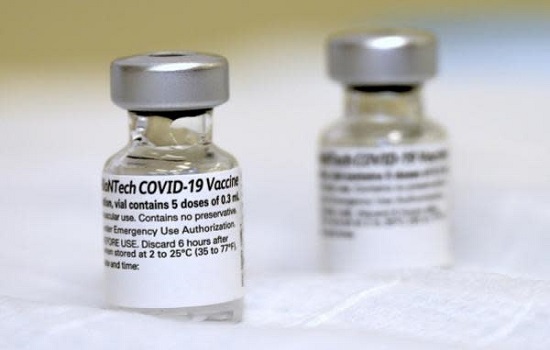Pfizer and BioNTech Announce Updated Clinical Data for Omicron BA.4/BA.5-Adapted Bivalent Booster Demonstrating Substantially Higher Immune Response in Adults Compared to the Original COVID-19 Vaccine
Pfizer Inc. and BioNTech SE has announced updated data from a Phase 2/3 clinical trial demonstrating a robust neutralizing immune response one-month after a 30-µg booster dose of the companies’ Omicron BA.4/BA.5-adapted bivalent COVID-19 vaccine (Pfizer-BioNTech COVID-19 Vaccine, Bivalent (Original and Omicron BA.4/BA.5)). Immune responses against BA.4/BA.5 sublineages were substantially higher for those who received the bivalent vaccine compared to the companies’ original COVID-19 vaccine, with a similar safety and tolerability profile between both vaccines. These results reinforce the previously reported early clinical data measured 7 days after a booster dose of the bivalent vaccine, as well as the pre-clinical data, and suggest that a 30-µg booster dose of the Omicron BA.4/BA.5-adapted bivalent vaccine may induce a higher level of protection against the Omicron BA.4 and BA.5 sublineages than the original vaccine.
“As we head into the holiday season, we hope these updated data will encourage people to seek out a COVID-19 bivalent booster as soon as they are eligible in order to maintain high levels of protection against the widely circulating Omicron BA.4 and BA.5 sublineages,” said Albert Bourla, Chairman and Chief Executive Officer, Pfizer. “These updated data also provide confidence in the adaptability of our mRNA platform and our ability to rapidly update the vaccine to match the most prevalent strains each season.”
“These data demonstrate that our BA.4/BA.5-adapted bivalent vaccine works as conceptually planned in providing stronger protection against the Omicron BA.4 and BA.5 sublineages,” said Prof. Ugur Sahin, M.D., CEO and Co-founder of BioNTech. “In the next step and as part of our science-based approach we will continue to evaluate the cross-neutralization of the adapted vaccine against new variants and sublineages. Our goal is to provide broader immunity against COVID-19 caused by SARS-CoV-2, including Omicron and other circulating strains.”
For the analyses, sera were drawn before (baseline) and one month after administration of a 30-µg booster dose (fourth dose) of the companies’ Omicron BA.4/BA.5-adapted bivalent vaccine. A subset of individuals, evenly stratified between those who had evidence of prior SARS-CoV-2 infection and those who did not, was selected for ages 18 to 55 years (n=38) and older than 55 years and older (n=36). A comparator group of participants older than 55 years of age (n=40) who received a 30-µg booster dose (fourth dose) of the companies’ original COVID-19 vaccine as part of a prior study was randomly selected, while ensuring the same equal stratification. Participants receiving the bivalent vaccine had their prior booster dose approximately 10-11 months earlier, whereas those who received the original vaccine had their prior booster dose approximately 7 months earlier. Despite this difference, pre-booster antibody titers were similar for both.
Among the overall study population who received the Omicron BA.4/BA.5-adapted bivalent vaccine, there was a substantially higher increase in Omicron BA.4/BA.5-neutralizing antibody titers compared to pre-booster levels. For individuals 18 to 55 years of age, the geometric mean titer (GMT) against Omicron BA.4/BA.5 was 606, representing a 9.5-fold rise (95% CI: 6.7, 13.6) from pre-booster levels. For individuals older than 55 years, the GMT was 896, representing a 13.2-fold rise (95% CI: 8.0, 21.6) from pre-booster levels. By contrast, participants over 55 years of age who received a 30-µg booster dose of the companies’ original COVID-19 vaccine had a lower neutralizing antibody response against Omicron BA.4/BA.5 measured one month post booster. For these participants, the GMT was 236, representing a 2.9-fold rise (95% CI: 2.1, 3.9). Therefore, the Omicron BA.4/BA.5 neutralizing antibody titers were approximately 4-fold higher for the bivalent vaccine compared to the companies’ original Covid-19 vaccine in individuals over 55 years of age.
Further, when examining those with or without evidence of prior SARS-CoV-2 infection who received a booster dose of the bivalent vaccine, there was a significant increase in neutralizing antibodies against Omicron BA.4/BA.5 in both groups, which was greater in those without prior infection. These data highlight the potential benefit of the bivalent vaccine for all populations regardless of previous SARS-CoV-2 infection. The safety profile remains favorable for the bivalent vaccine and consistent with the original vaccine.
Pfizer and BioNTech have shared these data with the U.S. Food and Drug Administration (FDA) and plan to share with the European Medicines Agency (EMA) and other global health authorities as soon as possible. A booster dose of the BA.4/BA.5-adapted bivalent vaccine has been authorized for emergency use by the FDA for ages 5 years and older and has also been granted marketing authorization in the EU by the European Commission following a positive opinion from the EMA for ages 12 years and older. An application for marketing authorization of the BA.4/BA.5 booster has been submitted to the EMA for children ages 5 through 11.
Separately, Pfizer and BioNTech are continuing to monitor immunogenicity of the BA.4/BA.5 bivalent booster against emerging Omicron subvariants. The companies also initiated a Phase 1/2/3 trial in September 2022, in September 2022, to evaluate the safety, tolerability and immunogenicity of different doses and dosing regimens of the companies’ Omicron BA.4/BA.5-adapted bivalent vaccine among children 6 months through 11 years of age.
The Pfizer-BioNTech COVID-19 Vaccines (COMIRNATY®), which are based on BioNTech’s proprietary mRNA technology, were developed by both BioNTech and Pfizer. BioNTech is the Marketing Authorization Holder for BNT162b2 Wild Type and BNT162b2 Bivalent (WT/OMI BA.4/BA.5) in the United States, the European Union, the United Kingdom, Canada and other countries, and the holder of emergency use authorizations or equivalents in the United States (jointly with Pfizer) and other countries. Submissions to pursue regulatory approvals in those countries where emergency use authorizations or equivalent were initially granted are planned.
About the Phase 2/3 Study
This arm of the multicenter, randomized, controlled Phase 2/3 trial has enrolled about 900 healthy volunteers 12 years of age and older in the U.S. who have received at least three doses of an authorized COVID-19 vaccine. During the trial, participants aged 18 years and older received either a 30-µg or 60-µg booster dose (fourth booster) of Pfizer and BioNTech’s Omicron BA.4/BA.5-adapted COVID-19 vaccine and participants aged 12 through 17 years received a 30-µg booster (fourth booster) of the same vaccine. Comparisons to support potential full licensure and registrations globally will be made with a control group who previously received a fourth dose with the original vaccine.
Source: Pfizer


